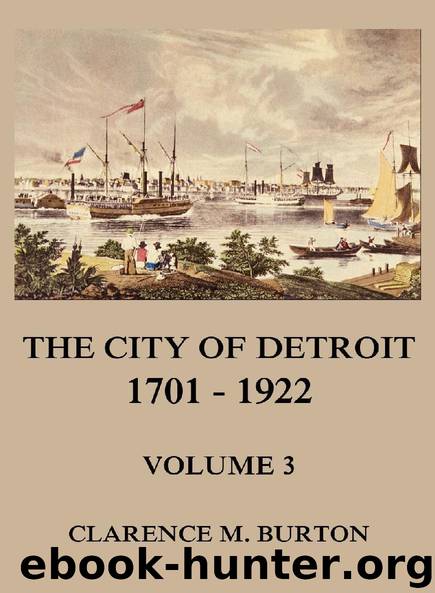The City of Detroit, 1701 -1922, Volume 3 by Clarence Monroe Burton

Author:Clarence Monroe Burton [Burton, Clarence Monroe]
Language: eng
Format: epub
Tags: Geschichte
Publisher: Jazzybee Verlag
Published: 2017-11-08T23:00:00+00:00
Hon. Charles P. Sumner, of Boston, wrote to Hull on March 11, 1825: "Your memoirs have had the effect of reinstating you in the good opinion of impartial and disinterested men and had that effect on me, although I am one of those who had some degree of prejudice to your disadvantage. One of the chief evils attendant on times of high political excitement is the facility it gives a dominant party to brand their rivals with opprobrium, and make even the records of the history of their country speak the language of malice and falsehood couched in the form of law. I believe that your character will not suffer in the estimation of unprejudiced posterity."
Many other opinions, voiced by the most intelligent writers and statesmen of the country, were published soon after Hull's war records were made public. In 1848, James Freeman Clark, Hull's grandson, wrote:
"I recall the image of a venerable, white-haired old man living in the midst of his children. All outward disgrace seemed to have fallen on his head, yet all were borne with cheerful equanimity. A soldier, he had been branded as a coward; a patriot, he was esteemed a traitor; loving the approbation of his fellowmen, he was the object of universal censure; naturally fond of public life and ambitious of public usefulness, he was under a sentence of irrevocable ostracism. No peevishness, no complaint, no querulous reference to a nation's ingratitude ever fell from his lips. On his deathbed, he declared in the most solemn manner his convictions that he had done right in surrendering Detroit, and expressed his happiness that he had thus saved the lives of the peaceable citizens of Michigan from being needlessly sacrificed. He died in November, 1825."
A number of General Hull's kin have been soldiers in the service of the United States. Hull's own son Capt. Abraham (or Abram) Hull, was bayonetted to death at the battle of Lundy's Lane, July 25, 1814, while in the extreme advance of the American line. General Hull's uncle, Joseph Hull, was one of the defenders of Fort Washington and afterward organized an expedition upon an old whale boat and captured a British armed schooner on Long Island Sound. Commodore Isaac Hull was a nephew of General Hull; and Commodore Andrew Hull Foote of the Civil war was a relative. Likewise, Gen. Joseph Wheeler, who won fame in both the Civil and Spanish-American wars, was of the same blood. General Wheeler, prior to his death in 1906, made an exhaustive investigation of General Hull's Detroit campaign, made thorough research in the files of the war department, visited Detroit and surveyed the scene of the campaign and sought every known source of information regarding the affair. His investigations convinced him that, while Hull made serious mistakes, the charges as brought by the court martial and Hull's personal enemies were manifestly unfair, while the court martial itself was an outstanding bit of legal perfidy.
INSUBORDINATION OF HULL'S OFFICERS
In his "Campaign of the War of 1812,"
Download
This site does not store any files on its server. We only index and link to content provided by other sites. Please contact the content providers to delete copyright contents if any and email us, we'll remove relevant links or contents immediately.
Savage Harvest by Carl Hoffman(1956)
The House of Rothschild: Money's Prophets, 1798-1848 by Niall Ferguson(1860)
The Art of Men (I Prefer Mine Al Dente) by Kirstie Alley(1462)
Joe Dallesandro by Michael Ferguson(1319)
Trump: The Art of the Deal by Donald J. Trump(1023)
The Cartiers: The Untold Story of the Family Behind the Jewelry Empire by Francesca Cartier Brickell(994)
Lady in Waiting by Anne Glenconner(982)
Si-cology 1 by Si Robertson(952)
Once Upon a Time in Russia: The Rise of the Oligarchs—A True Story of Ambition, Wealth, Betrayal, and Murder by Ben Mezrich(917)
Airport by Hailey Arthur(902)
Epstein by Dylan Howard(847)
A New Way to Age by Suzanne Somers(802)
Mick Jagger by Philip Norman(756)
One Day She'll Darken by Fauna Hodel(683)
Lana Turner by Darwin Porter & Danforth Prince(674)
Acting in Film by Michael Caine(653)
Billy Connolly by Pamela Stephenson(618)
Dirty Rocker Boys by Brown Bobbie & Ryder Caroline(617)
Live Original (Sadie Robertson) by Sadie Robertson(603)
